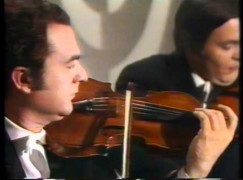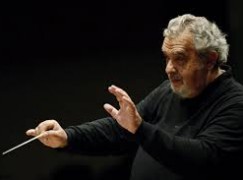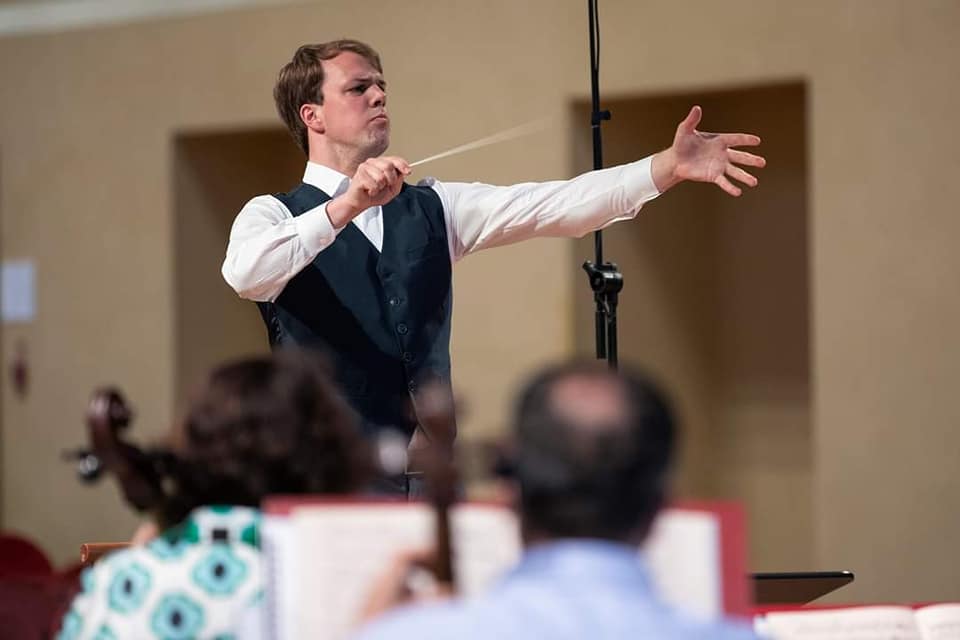Just in: Death of a Vienna Philharmonic conductor, aged 75
mainWe regret to share news of the death of Walter Weller, a concertmaster of the Vienna Philharmonic who became a widely-recorded international conductor. His wife, Sisi, shared the sad news today with colleagues in the UK.
Named joint concertmaster in Vienna with Willi Boskovsky at the age of 22, Walter also led his own string quartet until 1969. In 1966, he stepped in at sort notice for Karl Böhm and from then on conducted regularly at the Vienna State Opera and the Volksoper.

In 1977 he moved to Britain, becoming principal conductor first of the Royal Liverpool Philharmonic, then of the Royal Philharmonic in London and finally of the Scottish National Orchestra where he was so popular that his face appeared on a £50 Scottish banknote.
He made numerous recordings for Decca, EMI and Chandos, including a well-regarded Beethoven cycle with the City of Birmingham Symphony Orchestra.
He also held posts in Belgium, Spain, Switzerland and Germany (Stuttgart). His repertoire was extensive, rooted in the Austro-German heartland but containing many unexpected passions. He loved the company of orchestral players and was a generous and affable host.
Last month Walter was in Korea, conducting the KBS Symphony, which he described as one of the best orchestras he had known. On his return he was diagnosed with a pancreatic tumour and the end was swift.
Our condolences to Sisi, and their son.






Sad news indeed. He was a real musician, and a real conductor. My experience with Walter Weller amounted to a single memorable concert played while I was a member of the Houston Symphony Orchestra. He conducted a Brahms 1st Piano Concerto with Andre Watts, and a fantastic performance of Glazunov’s 5th Symphony on the same program. Incredible music making was heard that evening, with a palpable rapport between soloist and conductor, and a performance by the orchestra filled with the joy of discovery in the Glazunov. That show remains in my mind to this day. Weller will be sorely missed.
I was one of the last happy instrumentalists to record together with him ,and had the increadable chance and honour to record both Strauss Burleske and Brahms Piano Concerto n1 with Maestro Weller ,I would never forget this very special musically and humanly time and would always remember him as an increadably noble ,intelligent ,generous super musician and personality !!! Maestro ,rest in peace ,so many toughts of mine go for all your family ,which I like so much as well. Thank you forever !! Plamena
How very sad. My sincere condolences to his family. He conducted the first Ariadne auf Naxos I ever heard, at ENO. A brilliant production, with wonderful Sir Donald Sinden as the Major Domo and a wonderful ensemble cast. I thought Maestro Weller’s conducting brought out all of the subtleties of the piece.
We often heard him in Scotland where he was Principal Conductor of the RSNO. At his very best in the Viennese Classics, he was a truly great musician.
RIP, Maestro – and thank you.
A few years ago an invaluable box set of the Weller Quartet’s complete Decca recordings was issued; selected quartets by Haydn, Mozart, Beethoven as to be expected plus some less familiar fare: the Berg Quartet and the Shostakovich 10th of which they gave the western premiere in Vienna in 1965. The crowning glory of the box is their very final recording – and justly celebrated reading of the Schubert Quintet. To quote from the CD booklet: “Walter Weller recalls that they completed the first movement in the morning and the slow movement in the afternoon. However, as Weller puts it, “although every note of Schubert was there, we were not happy with our playing of the slow movement. It was not a feeling of Schubert”. So, after dinner with the Decca recording team, the suggestion was made that they might like to play the Adagio again, and they made this glorious recording in just one single take, with a small patch in the central section to cover some aeroplane noise. Weller says he will never forget the magical atmosphere recording late that night with the Sofiensaal lit only by candles, “one of those rare occasions when everything seems right”.
In his three years as Principal Conductor of the RLPO, there was a major improvement in standards and some very fine performances that I shall always remember, including a great Brahms symphony cycle, Bluebeard’s Castle and the first Martinu I ever heard. A great violinist too as my frequent playing of old discs testifies. A very fine musician and a sad end.
Sadly never heard Walter Weller in concert. For many years for me, his set of Prokofieff symphonies for Decca has been the standard against which all others are measured. Though there are certain recorded performances of single symphonies that might reach greater depths, Weller established the importance of Prokofieff as a 20th Century symphonist earlier and more firmly than any other conductor. My condolences to his family, and to his musical family around the world.
I first became aware of Walter Weller when I heard him conduct a magnificent performance of Dvorak 7 at the Proms in the late 70s but I wasn’t to meet and start working with him myself until the 90s. He was a very fine musician and a very nice man. One of the many qualities of a Weller performance and perhaps the most outstanding one was the sound he drew out of the orchestra. It was a warm, beautiful sound and very special. Every orchestral musician will confirm this I am sure and the public loved him for it. This sound happened as soon as he started conducting on the first day of rehearsals. Listening to his quartet recordings one can hear this in his own violin playing, one of the most beautiful sounds from a quartet leader that I have ever heard.
This is very sad news. He was a major figure also in Birmingham, where he appeared many times with the CBSO. He was my, and many other people’s, favourite guest conductor. As Michael Pearson says, he had a very personal sound, which came across, quite simply, as Viennese – warm, rich, smooth. He was one of those conductors who seemed to exude authority, and needed only a modicum of movement to get exactly what he wanted – though he had the most eloquent left hand in the business. And his interpretations always showed a satisfying structural command, whilst allowing time and space for pointing up details. He was, of course, very well known in many countries, but somehow I always felt he was somewhat underrated. To me, he was quite simply one of the greats.
A wonderful musician. Many thanks for everything.
Lovely man and a very fine conductor. Last time I heard him live was a hugely impressive concert performance of Elektra in Glasgow with Alessandra Marc. RIP
How sad! I baby sat and gave his son English lessons. Later, I played my first big solo with Weller as conductor in Denmark. Loved him and his family. Many wonderful memories!
His Prokofiev symphony cycle and his Dukas Symphony in C have a place of honor on my shelf.
Towards the end of Decca’s Ring cycle recording under Solti in 1965, there was a scandal that almost ruined it for everyone. They were making a recording of the Siegfried Idyll in its original chamber version and of course this means a small amount of strings — quartet plus double bass and, briefly at one point, a second viola. The producers asked if Weller could be used as first violin and permission was granted. They mistakenly thought it was OK to use the Weller Quartet (which they did) and found out the next day that they had been expected to use the principal chairs of each string section. Rehearsals went horribly and it took a harrowing amount of negotiating before various factions of the orchestra stopped looking daggers at one another and managed to successfully record the end of Die Walküre and, with it, the Decca Ring cycle that had begun in 1958 with Das Rheingold.
My father spoke fondly of Weller back in the 80s, when he was a regular guest conductor in several orchestras in Spain. I went to see him several times as a child. Afterwards, I met him as a pro musician 3-4 times, I think one of them being a concert with Plamena (was it Prokofiev concerto n. 1?). Great knowledge of strings (obviously), Vienna-style Mozart, Haydn, Brahms, Beethoven symphonies. Always with a smile, a respectful maestro (hard to see nowadays). Lovely man. RIP.
His superb recordings of the Dukas Symphony in C, a classic L’Apprenti Sorcier (perhaps the best ever), and the Brahms Hungarian Dances still have honored places on my shelves, on the original vinyl, long after many of my lps bit the dust.
Condolences to his family.
Super conductor and well liked here at RSNO. I was privileged to stage Flying Dutchman with RSNO in Glasgow with him at the helm so to speak. Great collaborator, he was open to many ideas and brought insight to the score. A real loss to the musical fraternity.
Many years ago (I think in the fifties), Walter Weller was invited by the Israel Philharmonic Orchestra to replace Joseph Krips who had to cancel due to illness. Together with pianist Ilana Vered we both performed the Alban Berg’s “Chamber Concerto”. This has been a wonderful experience – Walter Weller, who new this complicated piece by even heart – as musician as well as person fascinated all of us and was invited to return again and again.I still have the recording of the work and am quite proud of it, a wonderful memoirToo. RIP